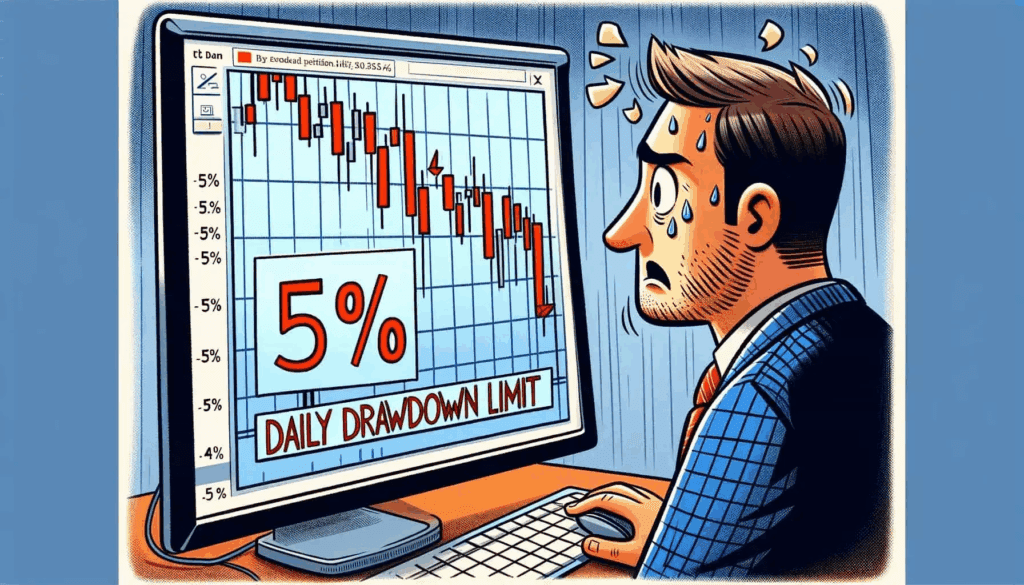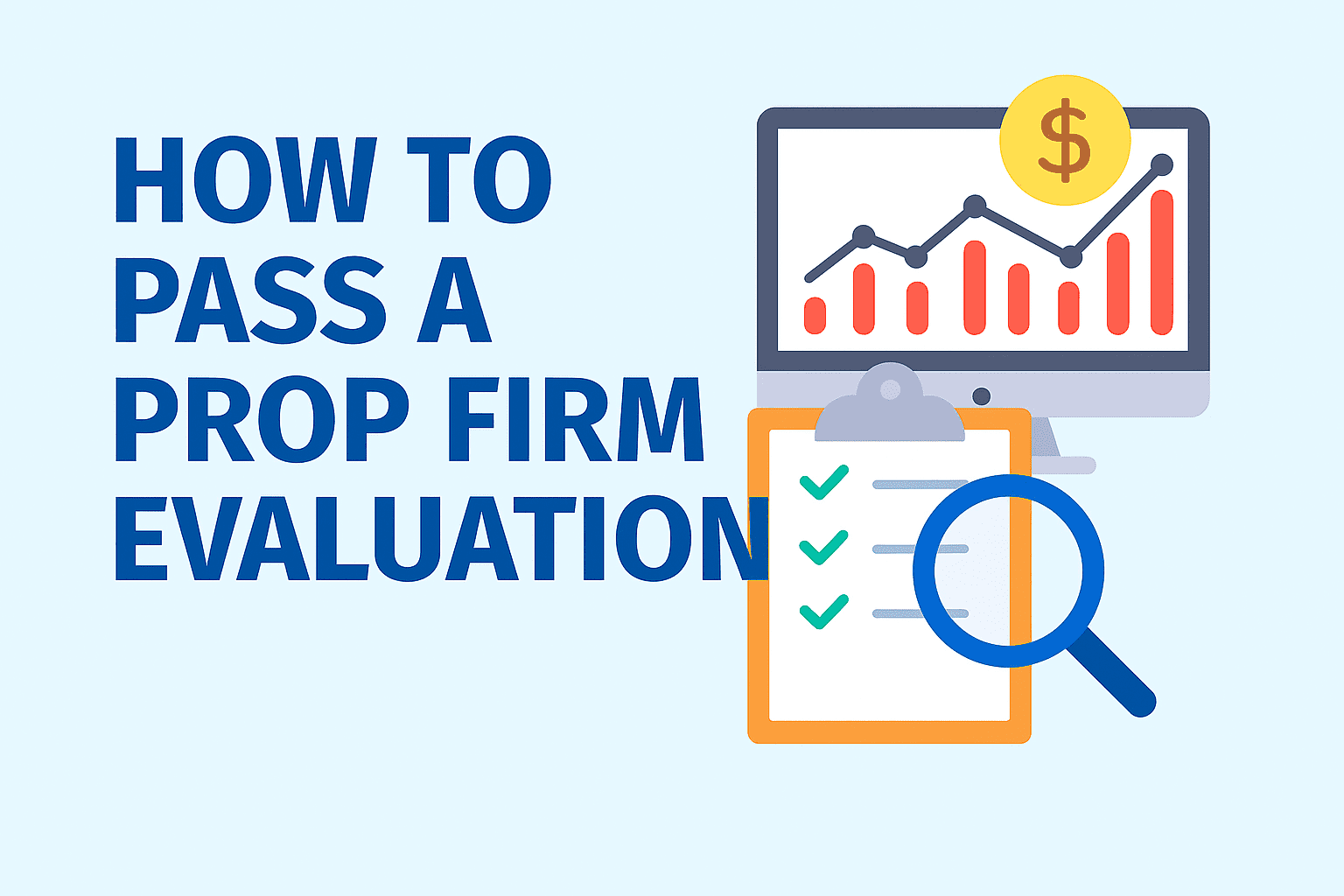This article will describe how to complete a prop firm evaluation, focusing on strategic approaches to thrive.
Discipline, steady trading patterns, and robust risk management are indispensable in gaining success in these evaluations.
I will provide essential advice, highlight frequent pitfalls you should steer clear of, and provide steps you can implement for you to achieve your profit target while respecting the firm’s rules, allowing you to develop a trading career professionally.
What Is a Prop Firm Evaluation?
A prop firm evaluation is a process that traders complete to receive funding from a proprietary trading firm. During this process, traders prove their skills in trading profitably and managing risk according to the firm’s requirements.
Most evaluations include profit target achievement in a specific time frame while managing drawdown limits and other risk parameters.

After evaluations are completed, traders have access to the firm’s capital and share the profits without risking their own.
Evaluations take different levels of difficulty and focus on aspects of consistency, strategy, and discipline, which makes them a pathway for traders who wish to trade professionally with large amounts of capital.
How To Pass a Prop Firm Evaluation
Understand the Rules Completely
Apprehend evaluation rules: profit targets, maximum drawdown, instruments, and time. Answer your questions before commencing.
Select the Suitable Account Size and Instrument
Pick an account and instrument that you are at ease with. Steer clear of new markets or strategies.
Construct an Effective Trading Plan
Document your trading plan, specify your entry and exit points, exit criteria, your risk per trade, and your daily targets. Work to the letter of your plan.
Risk Management is Crucial
Never exceed the risk per trade you set. Always protect your capital with a stop-loss order.
Trade Within Limits, Don’t Overtrade
Give priority to the best set-ups rather than quantity. Don’t engage in revenge trading.
Control Your Emotions
Discipline yourself. Don’t execute impulsive trades. Writing down your trades can show you where you are making mistakes and where you are succeeding.
Measure Performance and Adjust Slightly if Needed
Check how your performance lines up with your targets. Don’t make large tactical shifts in the middle of an evaluation.
Complete Evaluation Successfully
After achieving the profit goals while complying with the rules, submit for review. Successful completion allows access to the firm’s funded account.
Common Reasons Traders Fail Evaluations

Poor Risk Management: Overexposing capital with a few trades leads to account drawdown.
Overtrading: Excessive trading results in poor decision-making and unnecessary losses.
Lack of Discipline: Inconsistent performance is due to ignoring rules and strategies.
Emotional Trading: Impulsive trades due to greed and fear violate plan rules.
Unrealistic Expectations: Profit targets that are too ambitious raise the chance of errors.
Ignoring the Plan: Straying from the plan causes inconsistency and failure in evaluations.
Poor Market Understanding: Trading unfamiliar markets increases the likelihood of losing trades.
Revenge Trading: Trying to recover losses will often lead to larger losses.
Not Following Firm Rules: Performance will be disqualified if trading times or instruments are ignored.
Inconsistent Performance: Random losing trades with profitable ones show unreliability to firm.
Tips and Strategies for Passing a Prop Firm Evaluation
Understand the Rules Clearly
Know and consider every evaluation rule: profit target, max drawdown, trading hours, and what you are allowed to trade. Understanding every rule will help you avoid disqualification through accidental violations.
Use a Proven Trading Strategy
Use a trading technique you know works and avoid any evaluation method that introduces untested strategies in your game plan. Inconsistency will only cripple your chances of passing.
Prioritize Risk Management
Use stop-loss orders, limit how much you are willing to risky, and avoid overexposure to a position. Big profits are nice, but chasing every opportunity leads to blown accounts.
Focus on Consistency, Not Big Wins
Many small wins are regularly far preferred over a few large ones. Consistency shows discipline, something that will be evaluated and scored on your prop firm.
Trade Within Your Comfort Zone
Stick to the instruments, markets, and strategies you know. The higher the chance of you making a big mistake, the more likely you are to fail the evaluation.
Keep Emotions in Check
Impulsive decisions are the result of emotional trading and often breach your trading plan. Losses caused by emotional overtrading could very likely be the reason you don’t pass the evaluation.
Take Advantage of the Evaluation Timeframe

Schedule Your Trades – Don’t rush profits. Use the entire evaluation phase.
Trade High-Probability Setups – Don’t take low-quality trades to meet a frequency.
Build Profits Slowly – It’s better to take steady gains rather than try to hit a target quickly.
Learn from Early Trades – Fix small mistakes that occur without breaking the rules.
Avoid Last-Minute Risks – Don’t overtrade to hit a target; risk more near the evaluation period.
Common Mistakes to Avoid During a Prop Firm Evaluation
Ignoring Risk Management: Taking trades that exceed risk limits puts the entire account in danger of blowing.
Overtrading: Taking excessive trades results in more losses and mistakes.
Trading Emotionally: Acting out of fear, greed, and frustration results in undisciplined trades.
Deviating from Your Strategy: Abandoning a tested plan results in more inconsistency and chances of failure.
Chasing Quick Profits: Reaching for targets too quickly results in deep drawdowns.
Pros and Cons: How to Pass a Prop Firm Evaluation:
| Pros | Cons |
|---|---|
| Access to funded trading capital without risking your own money. | Evaluation can be stressful, requiring strict adherence to rules. |
| Opportunity to trade professionally and earn consistent profits. | High risk of failure if discipline or strategy is weak. |
| Helps develop risk management and trading discipline. | Time-consuming; evaluations may last weeks depending on the firm. |
| Provides real-world trading experience under firm guidelines. | Profit targets and drawdowns may limit flexibility in trading style. |
| Potential to scale accounts after passing evaluation. | Fees may apply for evaluation or platform access. |
| Builds credibility for future trading or funding opportunities. | Emotional pressure may lead to overtrading or revenge trading. |
Conclusion
In conclusion, discipline, consistency, and good risk management facilitate the success of a prop firm evaluation. Sticking to a strategy, managing emotions, and obeying the firm’s parameters are essential.
Thoughtful, incremental gains require far less stress and risk than reckless trades. Traders are taught to consolidate, exercise patience, and learn from mistakes to obtain funding and attain a professionally rewarding trading career.
FAQ
A test to qualify for trading a firm’s funded capital.
Typically 1–4 weeks, depending on the firm and account type.
Predefined gains you must achieve to pass the evaluation
The largest allowed loss before failing the evaluation.
Yes, as long as it follows the firm’s rules.












Got a Questions?
Find us on Socials or Contact us and we’ll get back to you as soon as possible.